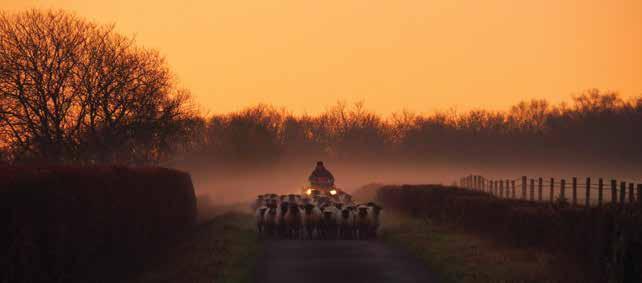
14 minute read
Feature
2001 - the year of the epidemic
When West Devon was caught in the eye of the storm...
Advertisement
Pictures by Mary Heard
While our lives are being turned upside down thanks to the coronavirus pandemic, exactly 20 years ago another virus was wreaking havoc in many countryside communities in the UK - and particularly so in West Devon. Many people say they remember clearly what they were doing when hearing of a world-wide incident - I read about the death of Elvis Presley while doing my paper round one sunny summer morning. In the same way, I remember talking to our next door neighbour, retired farmer Ginger White, in the bar of the Blacksmith’s Arms at Lamerton, the weekend that foot and mouth disease was discovered in Devon. The dread he felt was plain to see. I was working at the Tavistock Times then, the fax machine on the corner of my desk. In the months that followed, curled paper messages from DEFRA spewed out endlessly, recording the relentless march of foot and mouth across the countryside. Police kept watch by taped-off farm gates, fields steadily emptied, infected stock destroyed and even sadder, healthy animals killed, just for being ‘contiguous’ or next to a farm where the virus had been found. A total of 173 cases were confirmed in the county - some 390,000 animals slaughtered and burned on huge pyres. The effects of the epidemic were felt throughout the area, not just within the farming community. Public footpaths and bridleways were closed, stepping foot on farmland, common land and Dartmoor was prohibited, while disinfectant-soaked straw was laid down across carpark entrances in an effort to halt the spread of the deadly disease. Blowing in the wind, the odour of the pyres. Sue Wonnacott, whose family farm is just outside South Zeal, remembered clearly when the epidemic began in the county. ‘It was my 40th birthday on the 26th February and we’d had a party - when we were leaving at the end, somebody said they’d been called to say they’d discovered foot and mouth in Devon,’ said Sue. She said she and her husband were ‘very lucky’ and weren’t affected directly by the epidemic, although animal movement restrictions meant they couldn’t transport their stock. They also didn’t lose irreplaceable pedigree herds like many local farmers.

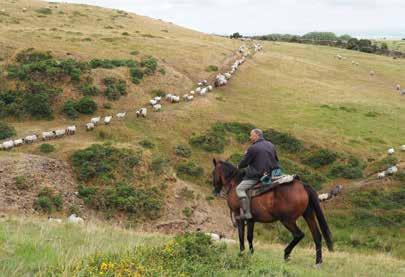
Gathering sheep, Vellake Corner - July, by Mary Heard
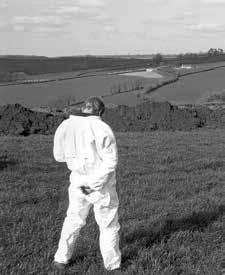
‘We used to go up into our fields on the moor in the evening and you could see the smoke and the pyres all around - it was an awful sight,’ she remembered. ‘But farmers are very resilient, they are very good at bouncing back, they get on with their lives. And the farming community is good at getting stuck in and helping each other out. It’s like now, people have come together and it’s brought out a lot of good in the community.’ Kevin Mott farms at Bridestowe. He and his father lost their closed herd of some 400 pedigree dairy cattle to the epidemic - confirmation of the disease ironically arriving on April 1st, 2001.
‘I think one of the worst bits was that we were playing the waiting game. It was all around us, it was just a question of time, then it got us,’ he said.
Kevin was in his early 30s then. He remembered the forced isolation of living on a farm where foot and mouth had been confirmed and how difficult it was for his Dad, seeing his life’s work destroyed. ‘There was the decision whether we carried on or gave up - we carried on. Then 9/11 brought things back into perspective. You can replace animals - you can’t replace people,’ said Kevin, who has since built up a new pedigree herd. Pete Heard of Yelland Farm, just outside Okehampton, remembered the day he saw suspicious signs of ill health in his sheep: ‘I noticed they were walking lame and they were off-colour. I looked at one or two closer and thought “that’s foot and mouth”.
‘I called the ministry, they said they’d come right down but it was nearly dark at that point so then they said they’d come at first light. They finally arrived at noon next day.’ Pete said 800 cattle and around 3,500 of his sheep were slaughtered - he managed to keep around 500 sheep that were up on the moor.
‘We was killing stock for six days, then we had the big fire to burn them all, then we started cleaning all the buildings. It was terrible - they even asked if I wanted them to put my dogs down - I couldn’t believe that. It was very upsetting.’ After such an experience, I wondered if Pete had considered leaving farming?
Preparing the pyre, Ramscliffe Farm, Beaford, North Devon © Chris Chapman 2001.jpg
Robert Kilby sealing the lane to Ramscliffe © Chris Chapman 2001 Maff employee monitoring the sedation of the herd © Chris Chapman 2001.jpg
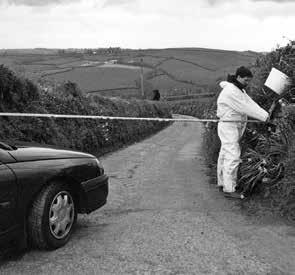

‘No, definitely not,’ he said emphatically. ‘At first we thought it was going to be very difficult to re-stock but it was remarkably quick. And it’s surprisingly how the farming community pulled together, even though we couldn’t visit anyone because we were afraid of carrying the disease - and when we first was notified, we had the police outside all the time, to make sure we didn’t go out.’ Christine Marsh of Okehampton was newly elected to Devon County Council at the time of the epidemic and was a member of the authority’s inquiry panel into the crisis. The 90-page report, Crisis and Opportunity, recommended that in future, culling of animals should be limited to those which had proven contact with infected stock, that research into vaccination should be carried out and that the army should co-ordinate the response to any future outbreak from the start - also that a national contingency plan be drawn up.
These images were recorded at Ramscliffe Farm in 2001 and have been reproduced with kind permission of local photographer Chris Chapman.
© Chris Chapman 2001 www.chrischapmanphotography.com

Christine was scathing of the way the epidemic was handled, labelling the destruction of animals, both those affected by the disease and the healthy ones, as ‘carnage by computer’. ‘It was horrifying - and the impact on the farming families was awful, seeing everything slaughtered before their eyes. There was no compassion.
Sarah Budd-Bell
Midwife and acupuncturist
‘Sharing the moment of birth with a couple, trying to make that experience as good as it can be, is one of the biggest privileges anyone can have, it’s just wonderful,’ said Sarah, who might be retired, but is still as passionate as ever about midwifery. Sarah was born in Kent but spent some of her childhood in Ireland and has Irish citizenship. Coming from a family with a medical background it was perhaps inevitable she would pursue a career in medicine, qualifying as a nurse in 1979 after training in London. After a ‘fantastic’ year working in Australia, she returned to the UK and started her midwifery training at Freedom Fields Hospital in Plymouth. Working as a sister in the maternity department, it was her acupuncturist friend Penny Brohn who persuaded her to study the ancient Chinese art.
‘I wanted to offer women more choices of pain relief in labour and promote more natural childbirth,’ said Sarah. ‘In the 80s TENS machines were only just beginning to appear, generally the only thing offered was gas and air and pethidine or an epidural - I thought we could do better than that.
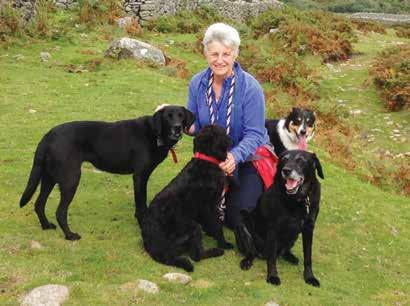
‘I had tremendous support from my bosses at the time, I managed to get some funding and I started training in London part time while I was still working. The training was for three years, but when I finished I didn’t feel ready to start using acupuncture on pregnant women, so I cheekily asked if I could go to China!’ Sarah must have been very persuasive; thanks to a bursary from the hospital, she spent a month working in a hospital in Nanjing: ‘It was full-on, really busy, but wonderful in terms of confidence and experience, so when I came back, I was really ready to go! ‘I started using acupuncture for pain relief in labour, then some of my community midwives asked if I could help with other problems like sickness and backache,’ said Sarah, who explained that acupuncture has been proven to stimulate the production of endorphins and other chemicals to naturally counteract pain. At the time, Sarah was the only full time acupuncturist midwife in the country, but she ended up heading a team of three in Plymouth. ‘Acupuncture doesn’t work for everybody, and in some cases it’s not enough, but it doesn’t stop women having other forms of pain relief as well.
In some cases it worked so well it almost caught me out, the woman would be so calm!’
We are an independent practice. We strive to give excellent care for your animals and yourselves. Our practice covers all species, which gives the strength of multi-discipline knowledge and invidual expertise within the team.
EMERGENCY SERVICE BY THE VETS YOU KNOW • 3 Vets • 24hrs • 365 Days of the Year - covering companion animal, farm and equine species
Okehampton 01837 658777 • North Tawton 01837 82327 • Hatherleigh 01837 810455 Equus Vets (equine vets) 01837 214004
Sarah is married to Okehampton doctor Tom Bell and with the arrival of their two children she decided to work part time, although alongside her NHS work, she developed a private practice, worked as a research assistant at Exeter University and still teaches acupuncture and acupressure. ‘I’ve taught in Canada, France, Italy, Germany, Austria, Denmark and Ireland, teaching midwives to do acupressure for pain relief in labour, with the idea we also teach couples, so the birthing partners can provide pain relief - we did this at Derriford with huge success,’ said Sarah. ‘It gives them something to be involved with and when you see it in action it’s wonderful.’
Inspired to take her learning even further, Sarah completed an MSC in 2019, her dissertation on the condition hyperemesis gravidarum, or extreme morning sickness. ‘It’s a dreadful condition we treated a lot at Derriford but the research behind it is poor and there’s very little in terms of acupuncture. I wanted to try and address that,’ said Sarah, who travelled to Cambodia last year to teach the use of acupressure points to help reduce pain in labour. While there, she also taught another technique using acupuncture points on the ear - this has been used successfully to treat the after effects of trauma, for example, on those who experienced the terrifying fire at Grenville Tower. Sarah was due to do voluntary work there, and also for the Force cancer service in Okehampton, when the Covid 19 pandemic intervened. Very sadly, the acupuncture service offered in Plymouth ended in 2012, by which time some 8,000 women had been treated with acupuncture on the NHS, a service recognised with an award presented by Prince Charles. Sarah, who loves to keep fit by cycling, running and walking, is sad the good work carried out by the service, all evidenced, was not deemed a financial priority. ‘I would love to see it more widely available and those midwives that want to use it doing so as part of standard practice - that would be my dream.’

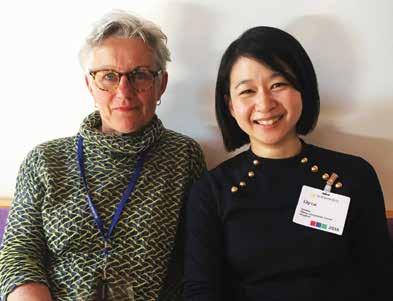
Our unique home enabling service is fl exible and dementia-friendly. Home-cooked meals, country walks, household admin – and much more… We provide a personalised package of support, helping you or a loved one continue to live safely, independently and happily at home.
Call Claire to discuss your needs 0800 043 1080
www.friendlyfacesuk.co.uk
Anna Georghiou
Artist, musician and complementary therapist
Whether it’s playing the didgeridoo, painting a mural or practising aromatherapy, creativity is the positive force that flows in cheerful abundance through Anna Georghiou. Anna was brought up in South Devon, apart from a few years when she lived in South Wales. Although she achieved her A-levels, she said she was never particularly happy at school and it wasn’t until she got to university in Northampton that she was diagnosed with dyslexia. She now views this as a gift, recalling how one of her former professors described those with condition as people who ‘see the whole of the moon’.
‘It’s a really positive way of looking at it,’ said Anna. ‘I might not be able to read a bus time table but creatively, musically, things come out in a different way for me.’ Having originally intended to study PE and Art, she did an about-turn and opted for a degree in psychology and philosophy, which she followed up with a year in Edinburgh, working with adults with learning difficulties. Anna’s father is from Cyprus and following a desire to connect with her roots, she headed for the Mediterranean in 2004, where she studied art.
‘The art college was very different to those in the UK, it allowed you to find your own path, find yourself as an artist,’ said Anna, who attained a teaching certificate as well as her degree while in Cyprus. She also met her husband there, artist and musician Phil Bird, the couple eventually returning to the UK in 2010. Anna said: ‘It wasn’t an easy decision - but when it’s time to move, the universe has a way of moving you on. We came back and thought “Where shall we go?” The reason we chose Okehampton was Phil would come here often because he got his guitars from Brook Guitars nearby.’ Anna admits that moving to West Devon from Cyprus it was a bit of a culture shock - but it’s a move she and Phil don’t regret.

‘I love it here, it’s a beautiful place to live, it’s moody, heady, the light, the evocativeness, the wildness and the hidden magic, nature, trees and rivers are wonderful,’ she said.
Within a short while of settling into the town, they had set up Okehampton Acoustic Club: ‘We had musicians from all over attend, from as far away as Oxford and Cambridge and local as well, plus musicians and poets, said Anna, who plays piano, flute, recorder, clarinet and tin whistle as well as the aforementioned didgeridoo. The couple’s next venture was to set up Ocmundtune Creative Arts: ‘We had local people help us get funding and
www.mbcaccountants.co.uk
Business Specialists 01837 55482
PROFESSIONAL IT SUPPORT FOR HOME AND OFFICE
Home set-ups, problem solving and friendly advice. REMOTE ONLINE HELP
availble during lockdown
We’ll maintain your communications!
Call or email Viv Griffi n 01647 440006 help@dartmoor-it.co.uk
Dartmoor IT

we put on a great event in 2014, with workshops and music, exhibitions, all sorts of stuff.’
Since then, Anna has been involved in a wide variety of musical and artistic projects, either by herself or collaboratively with Phil. They frequently travel abroad to complete art commissions and are looking forward to returning to Cyprus, where they are due to paint a large mural at an old mill being renovated as an exhibition space. Alongside art and music, Anna has always been interested in essential oils and complementary therapies - having completed a diploma in aromatherapy several years ago, she has since qualified in reflexology and reiki. She explained she often combines aspects of each therapy with her clients, depending on their needs. Thanks to the ongoing pandemic, her work has had to move online but she still feels able to empower people with the skills to help themselves.
Sadly her mum passed away three years ago in hospital and the experience made her determined to pass on her knowledge, in the hope she can help others.
It led to the formation of Okehampton Community Wellbeing For All last year, which she runs with Eve Olivera.
‘I felt more people should have access to the complementary therapies and I have seen how beneficial they can be, not just to the person receiving them but family members of really sick people.’ Anna readily embraces the challenges life throws her way and the opportunity to learn. She admits her Dad was always telling her ‘You can’t be a student forever Anna’ - but she is keen not to be shackled by boundaries. ‘Life is a journey,’ said Anna. ‘If you are moved or drawn to something I think it’s important to give yourself the opportunity to have a go at stuff. It’s nice to share this knowledge with people.’
Jane Honey
The Closest Natural Burial site to Dartmoor
For further information please contact: Christopher Voaden 01363 877807
ellacoucheB down to earth - using wool
Shrouds and soft cocoons for a gentler return to the earth

A sustainable choice, working direct or with local funeral directors Ask for a brochure







